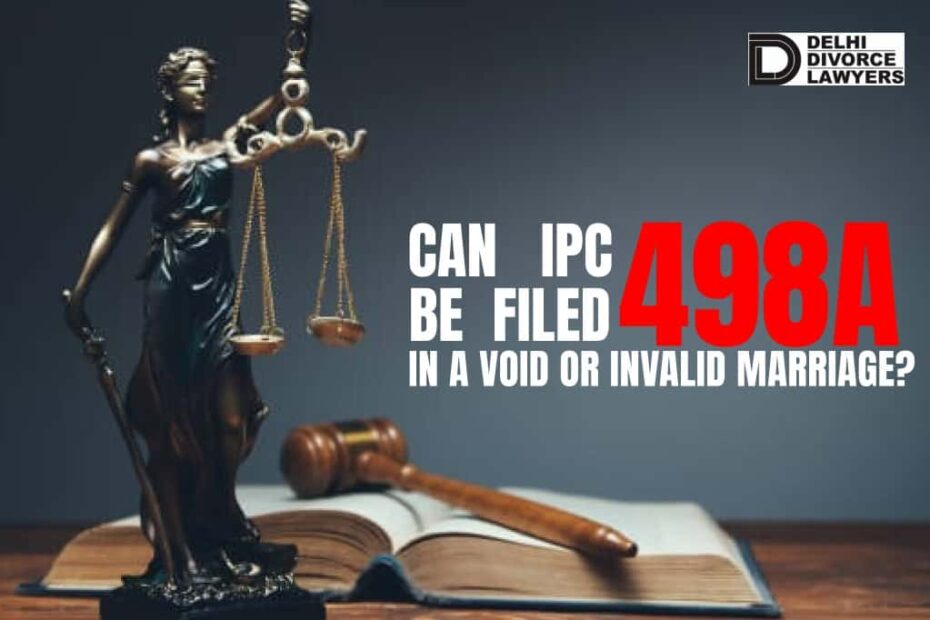This article goes deep into understanding the requirement of a valid marriage for attracting an offence under Section 498A of the Indian Penal Code (IPC). As per the definition of 498A, ‘husband or relative of the husband of a woman subjecting her to cruelty, shall be liable for imprisonment for 3 years with fine.’ The said provision was inserted in 1983 to protect a married woman from harassment and cruelty relating to dowry demand, including all types of physical harassment, mental torture, etc.
Motive behind the enactment of Section 498A
The provision was brought in force aiming to protect married women from domestic violence. In the case of Amar Singh v. the State of Rajasthan, AIR 2010 SC 339– The Court defined cruelty for Sec. 498A of IPC where a husband starts taunting for not bringing dowry and calling her ugly. Such acts of taunting by the husband would constitute cruelty both within the meaning of Sec. 498A of IPC.
In another case of Inder Raj Malik v. Sunita Malik, 1986 CrLJ 1510- The Court held that cruelty is the harassment of a woman to coerce her or any related persons to meet any unlawful demand for any property or any valuable security is cruelty.
Facts of Abhishek Singh Vs State of M.P. in brief
The petitioner was appointed as Constable on 07.10.2015 in the respondent department on compassionate ground after death of his father. A compliant was lodged by complainant/respondent No.4 Sita Ahake that she got married to one Abhishek Yadav in May 2017 and a son was born out of this wed lock. That a dispute occurred between the two and thereafter Abhishek Yadav went away with their son.
That despite of the search, he was not found. That a Writ Petition was filed and the petitioner went along with respondent No.4 to Haryana to search the child and by making false promise of marriage, established physical relationship with her and thereafter refused to marry her. In this regard, a complaint was made to Superintendent of Police (SP), Betual, and on 29.01.2020, the petitioner and complainant were married in Arya Samaj Mandir. It was alleged that, after marriage, when she went to live with the petitioner, he and his mother treated her with cruelty and refused to give her the status of wife. On the basis of this complaint, FIR was registered at Crime No.492/2020 for the offence punishable under Section 498-A of I.P.C.
Issue before the court
Whether the petitioner is liable to be convicted under Section 498-A of I.P.C?
It was noted by the bench that the complainant/respondent No.4 was already married and he had a living spouse, when the second marriage was contracted with the petitioner. The court pointed out that there is no indication of word ‘valid marriage’ in Section 498-A of I.P.C. and it merely says ‘husband or relative of husband’. Hence, it shall not mean only those who are validly married but also to them who have undergone some or other form of marriage and hence amusing themselves as a married couple.
The case of Reema Aggrawal v. Anupam and others, was referred by the High Court of Madhya Pradesh and it was held by the Court that “…..The concept of marriage to constitute the relationship of ‘husband’ and ‘wife’ may require strict interpretation where claims for civil rights, right to property etc. may follow or flow and a liberal approach and different perception cannot be an anatheme when the question of curbing a social evil is concerned…..”
It was further held by the court that“……….It would be appropriate to construe the expression ‘husband’ to cover a person who enters into marital relationship and under the colour of such proclaimed or feigned status of husband subjects the woman concerned to cruelty or coerce her in any manner or for any of the purposes enumerated in the relevant provisions Sections 304B/498A, whatever be the legitimacy of the marriage itself for the limited purpose of Sections 498A and 304B IPC.”
It was clarified by the court that except the exceptional circumstance, the Court cannot look to any document relied upon by the accused as his defence. It added that the constitutional or inherent powers of the court to quash the proceedings at the initial stage should be exercised sparingly. It should be done when the allegations made in the complaint or the FIR, if it does not disclose the commission of any offence prima facie. At that stage the Court would not embark the appreciation of evidence nor can the Court prejudge a disciplinary enquiry, especially in cases where the investigation is still incomplete.
The order was passed by Justice Nandita Dubey, wherein it was concluded that “whether the offences are made out is a matter of trial and at this stage, I am not inclined to exercise the inherent powers to stifle a legitimate prosecution, when the investigation is still pending, nor is it proper for the Court to look into the material brought by the petitioner as the acceptability or veracity of such documents is a matter of trial.”
It was concluded by the High Court of the Madhya Pradesh that in the absence of a definition of ‘husband’ it cannot be presumed that only those whose marriage is valid are husbands. However, the term ‘husband’ includes only such persons who contract marriages ostensibly and cohabitate with such woman, exercising his role and status as ‘husband’ and there is no ground to exclude them from the purview of Section 304B or 498A IPC. That the aim and object of the said provisions of the law needs to be considered.

